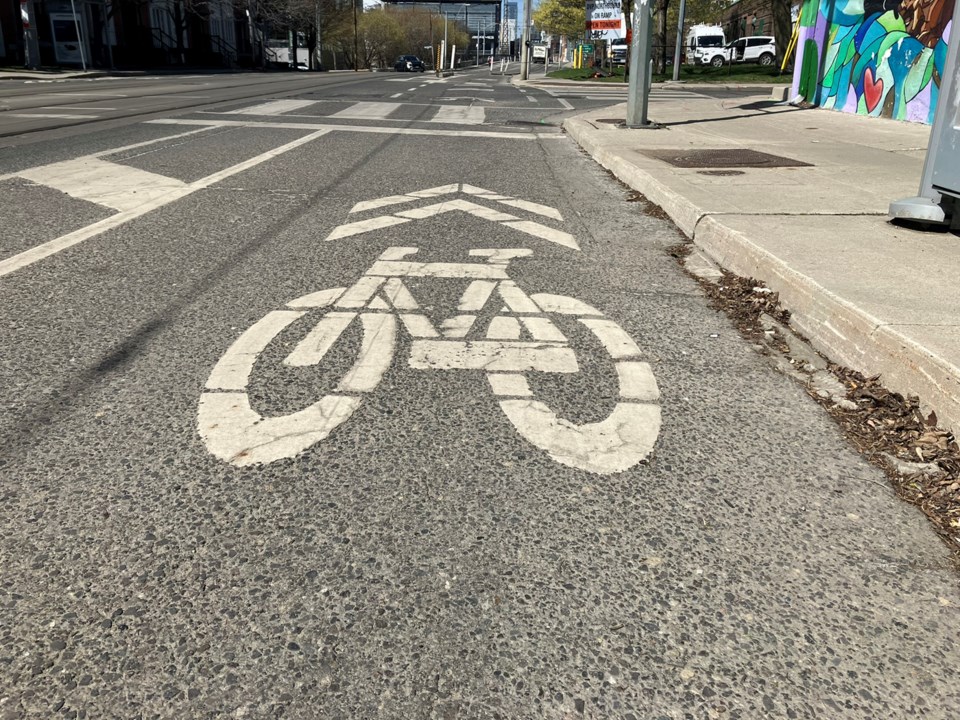This article was first published by TorontoToday, a Village Media publication.
Premier Doug Ford followed through with his threat to fight back against an injunction preventing his government from tearing out three major Toronto bike lanes.
On Wednesday, the province sought leave to appeal the April 22 injunction, the first step in a multi-stage process that could take months to play out.
However, the Ford government asked the court to expedite the appeal process and stay the injunction immediately.
“As we’ve always said, we need to keep our busiest roads moving and that’s exactly what we’re doing,” said Dakota Brasier, spokesperson for Transportation Minister Prabmeet Sarkaria, in a statement to TorontoToday.
It’s the latest development in a pitched battle that has wound its way from the provincial legislature to the campaign trail and now into the legal system.
In late April, Superior Court Justice Paul Schabas barred the Ford government from removing bike lanes on Yonge Street, Bloor Street and University Avenue until he determines whether the move is constitutional.
In its appeal documents, the province’s arguments revolve around two key points: a conflicting ruling from another judge and “good reason” to doubt Scabas’ decision.
Weeks before Schabas issued his injunction, Superior Court Justice Stephen Firestone refused to grant one. Firestone wrote the applicants — Cycle Toronto and other biking advocates — did not meet the “heavy burden” of convincing the court to “second-guess the wisdom” of government policy.
Schabas’ decision "conflicts with the decision of Firestone issued only weeks earlier after reviewing the same evidence,” government lawyers wrote.
Additionally, the province argued Schabas did not follow the legal doctrine of “horizontal stare decisis,” which largely requires judges at the same level to follow each other’s rulings.
The province said Schabas “erred” in his injunction decision because he did not “give sufficient consideration” to the presumption that the public interest will be harmed if legislation is blocked, nor did he properly assess whether the removals violate the Charter’s guarantee to life, liberty and security of the person.
After Schabas granted the injunction, Sarkaria said his government would “respect” the court’s decision but "continue with the design work necessary to begin removals as soon as possible, should the decision uphold the legislation."
However, the premier disagreed.
On April 30, Ford launched a salvo against the ruling, arguing the injunction was granted “not because of law” but “because of the ideology.”
“Those bike lanes are coming out one way or another,” the premier said. “Judges should not determine items like bike lanes.”
Michael Longfield, executive director of Cycle Toronto, said the government should “abandon this bad faith culture war and cancel this legislation.”
“Today’s decision by the province is a distraction, fuelled by spite, coming off last week’s rant from the premier that had a few inconsistencies with the truth and seriously undermined judiciary independence,” Longfield added.
The saga started last October when the province introduced Bill 212, the Reducing Gridlock, Saving You Time Act.
The law directs the removal of bike lanes on Bloor Street, Yonge Street and University Avenue and requires municipalities to ask for provincial permission to install a bike lane when it would remove a traffic lane for cars.
Ford and other members of his government claimed the measure was necessary because bike lanes contribute to Toronto’s massive congestion issue.
In November, TorontoToday obtained a draft briefing document for Ford’s cabinet, where civil servants warned the removals probably won’t ease the city’s traffic woes. In recent weeks, Mayor Olivia Chow — a bike lane defender — appeared to be nearing a compromise with the province.
On April 8, Sarkaria’s office said the province would be willing to collaborate with the city on squeezing both car and bike lanes onto streets — but Toronto must foot the bill.
“Where both a reinstated car lane and a bike lane can exist, we are open to collaboration with the city of Toronto, provided they fund their portion of their identified infrastructure needs,” the minister's office told TorontoToday.
—with files from Jack Hauen, Jesmeen Gill and Steve Cornwell




